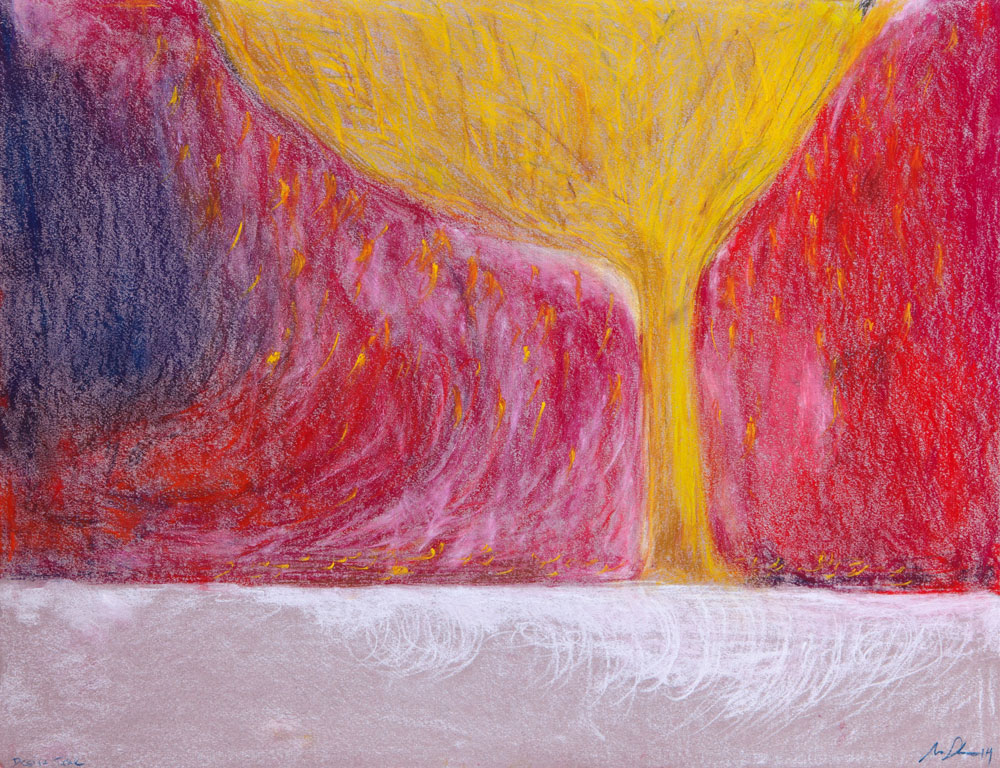
Mathura. Photo: Kaari Saarma
Words carry in themselves a paradox which is that each person can understand them differently from all others. It is thus quite possible that two people talking of apparently the same thing can mean something vastly different by it. There is thus also a multitude of ideas as to what is spirituality or what could be termed as such. I have personally been long fascinated by how the ancient teachings of India describe the process of creation. According to these texts, the more coarse is always attached to something more subtle – the physical to psyche, matter to spirit, etc. Besides, they talk of eight, rather than four or five material elements – there is earth, water, fire and air, which are followed by more subtle aether, or the environment that carries sound. On top of these five, three finer material elements are mentioned, such as mind, intellect and one’s material self-identification or the material ego. Submitting to such notion of reality, the concept of spirituality needs to be reserved to something extending beyond the said elements, i.e. something capable of gazing beyond time and space.
The idea reveals a principal difference between the traditions of the East and the West as to what is deemed as “spiritual”. In the West, the notion has come to mean, primarly, one’s being well-read and cultured – in order to be “spiritual”, one is supposed to be educated and know a lot and, perhaps, not be overly indulged in carnal pleasures (even though the latter isn’t even an absolute assumption). The spiritual people are thus supposed to be interested in aesthetics and arts, attributing no value, however, to their aspiration to reach beyond the grasp of the aforementioned elements. Overall, the Western notion of “spirituality” thus stands in for one’s mental and intellectual capabilities. In the East, on the other hand, education has traditionally meant education of the spirit, and wisdom is only applied wisdom, expressed not so much in man's knowledge, but in his personal qualities and insight. Eastern culture places little value on the performer or author, what matters is the objective or dedication of the work created. Spirituality of the East is therefore primarily an experential rather than an intellectual enterprise; the spirituality or materiality of something is determined not so much by the nature of a deed or action itself, but by its objective or intention.

Mathura. Guardian.
Dry pastel, inktense on paper, 2015 In this view, even religion can turn into materialism if,
instead of aiming at serving God and his creation, its pursuits become directed at accumulating disciples, amassing material affluence or abusing one’s hierarchical superiority for personal good. Examples of that are likely to be found in the history of every religious movement, due to what is a concept
largely forgotten in the contemporary West – one’s material ego, or decision to regard one’s material condition as fundamental. Egoism can be described as the situation of regarding oneself as the final proprietor of one’s material belongings and to see one’s material attributes as the whole of one’s nature. Frequently, distortions of religion have been met with the rejection of the whole tradition. In my view though – to use the West’s own metaphor – the baby has thus been thrown out with the bathwater in failing to discriminate between the teaching and an institution.
Postmodernist ideology that tends to dominate our current cultural sphere lays down a claim that there are no absolute values – except for the “fact” of their absence. Erring thus against its own essential assertion, postmodernism sets itself up as an absolute criterion and abolishes, among everything else, any deeper credibility of a religion. However, it would be fair to ask here what religion actually is – whether it is a man-made intellectual concept or, perhaps, a far deeper instinct. In other words, is our search for God a man-devised process of meaning-making or could it rather be something hereditary to us as inherently spiritual beings.
Looking at the history and present of human society, there is fair cause to claim that something is always placed in the position of God (to be regarded as the highest, supreme, irrefutable). When the top of that hierarchy is no longer occupied by the church, the seat is taken over by science or some ideological dogma. Yet even when denying the existence of anything absolute, people still try to establish or create a source of infallibility – something that would provide them with all the answers, something they wouldn’t need to doubt. However, this reminds me of a wise man who once said that faith in God can only be real if it doesn’t rise out of fear for a Godless reality. In other words, coming to terms with God's possible non-existence awards one sole personal responsibility for his or her life and thus responsibility also for what one reflects back or radiates into the world. This, in turn, offers a person freedom to love God without expecting him to relieve one of personal responsibility and leaves one, at best, just hoping for forgiveness for mistakes that will be our inevitable companions on our path toward improvement.
Perhaps it would be wise to apply the same logic to man’s relations with science as well, for it is science that is nowadays often placed in the position of infallibility. To concede everything into the hands of science is essentially an equal strategy to entrusting everything to God, more so if one is not taking heed of the criteria and contextualizations, and their subsequent shortcomings, that any particular scientist has based his views upon (or a particular priest based his interpretations of a scripture on). This would also mean clearing oneself of personal responsibility for some form of understanding of the subject matter. Moreover, such approach seems to disregard the deeper gist of science that great scientific innovators like Albert Einstein have referred to by saying, “There are only two ways to see the world – either to regard everything a miracle, or to see nothing as a miracle.” In Einstein’s view, science should thus also eventually point at something materially immeasurable or even undefinable – point at a Miracle.

Mathura. Tree of Wishes.
Dry pastel on paper, 2015 |

Mathura. A chat.
Dry pastel on paper, 2015 |
Paolo Sorrentino’s TV series The Young Pope starts with another fascinating take on spirituality. He says in the words of his protagonist (I’m quoting excerpts): “What have we forgotten? What have we forgotten? Play is the only authentic means we have to make us feel in harmony with life. And to be in harmony with God, we have to be in harmony with life. We don’t have a choice: we must be in harmony with God! And what else have we forgotten? Not only have we forgotten to play, we have forgotten to be happy. And there is only one road that leads to happiness. And that road is called freedom.” Freedom – but we could also call it responsibility.
It is remarkable that playfulness is treated here as something inherently spiritual or divine, for playfulness has several significant presumptions – to play means to accept unpredictability, to be sincere, joyous of discoveries, to be in the flow. It means to be part of something larger than oneself, instead of standing aloof and ruling reality according to one’s solitary will. Admitting that we do not actually have a choice whether to live in harmony with God or not, we are faced with considering how true our customary understanding of the notion of God actually is. When an Indian scholar Swami A.C. Bhaktivedanta was once asked whether God is a person or impersonal, he replied that God is both. God can be seen as the creator of the entire existence, but also as that existence itself – one that we belong to as well. And in such a case, denying the existence of God would ultimately mean a denial of our own existence. If seeing God as the entirety of existence, we can’t help but follow its workings – we will be part of his “game”, regardless of whether or not we are aware of it.
When we step into a world more subtle than the above-mentioned eight material elements, we can no longer rely on any materially measurable criteria, but will need to orient ourselves to something finer. What we’re left with is no longer data or intellectual erudition, or a set of aesthetics, but first and foremost our own personal attunement – the way we relate to the sum total of existence.
One of the primary features of spirituality could thus be viewed to be an Einsteinian realization there is no finished reality, or no reality that is static, for everything develops and changes in response to everything else. Spirituality is being surprised. It is a discovery. Spirituality is exaltation. Whoever wants to live in a world without miracles, must renounce his soul or perhaps even the idea of it.
This is one of the reasons why totalitarian systems often first attack spiritual teachings and concepts – miracles cannot be subjected to power, the same as people who experience them.
This is also the reason why the actual core of any mysticism is simplicity. Mysticism takes notice of that which is too simple for others to acknowledge – something, for example, that a child would experience and see, but that we refuse to account for later on in our lives. For a mystic, the world is too dynamic to be squeezed into measurable frames, and there would be no use for this.
What would a yogi or a monk from the year 1022 say to us today? What would Wim Wenders' angel from his Wings of Desire tell us ? What would a imaginary “child of heaven” out of 3022 tell us? Maybe just that – we should dare to live and bear responsibility for it, and to see life as a miracle. We should learn to listen and listen up, instead of declarations and slogans in the wake of our consumerism. Or perhaps they would remain silent and just gaze at us as well-wishing witnesses, and say a prayer for us. Or hand us a word of prayer for us to use that in best possible capacity. It is my belief that what we need is not another formal religion, but first of all a change in our perspective that would allow us to see things in a broader way, to look at things from a rather more all-encompassing vantage point. What we need is perhaps just to be aware of ourselves as part of a larger, unmeasurable whole – and to recognize the importance of playfulness on our path towards content or happiness which would be more than a mere absence of suffering. For it is the inevitability of suffering in this world that is another of those realizations that seem to repeat among spiritualists of various traditions.
Mathura
is an Estonian writer and artist who has translated both contemporary and classical Indian literature. He has received various literary accolades, such as the Gustav Suits poetry award. See his other texts “Spirituality as the Antithesis to Intellectuality” (Epifanio 4/2006) and “Tarkovski and his Vision” (Epifanio 7/2007).
|




